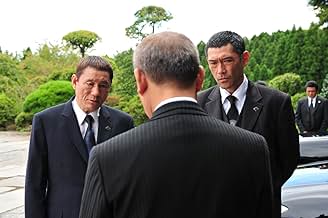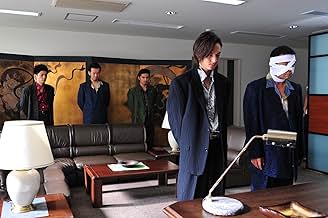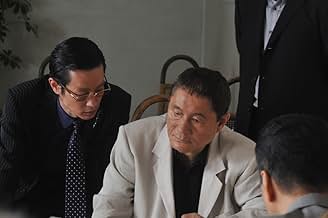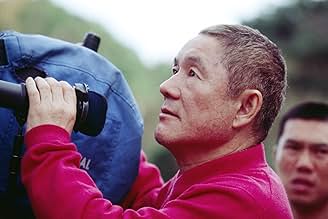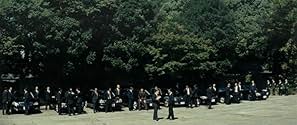O chefe de um clã ordena que seu subordinado bote uma gangue na linha, entre traições e extorsões, nem tudo dá certo.O chefe de um clã ordena que seu subordinado bote uma gangue na linha, entre traições e extorsões, nem tudo dá certo.O chefe de um clã ordena que seu subordinado bote uma gangue na linha, entre traições e extorsões, nem tudo dá certo.
- Prêmios
- 1 indicação no total
- Ôtomo
- (as Beat Takeshi)
Avaliações em destaque
There are random acts of extreme violence that continue to propel the plot forward. Kitano, playing the underboss Otomo, is a similar role to his other characters in yakuza movies which portray out of control individuals that have a minor standing yet have the last word at the end of the play. Rather than focusing on the beauty of mobsters hiding out on the beach, this is a gritty, urban drama much in the tradition of Johnnie To's triad movies (Election) that has dominated the organized crime dramas over the past decade.
In showing the criminality of the human mind, it evokes Mario Bava's study in Rabid Dogs, similarly Kitano is building a Brechtian inspired drama about the harsh existential life. Kitano continues to explain and further define his worldview through the character of a doomed nihilist anti-hero. In all of Kitano's yakuza character studies, there is no hope, or redemption, only a further plunge into an ugly existence of lies and deceit, where only an act of violence can bring about change.
As Kitano remarked publicly about his making of Outrage, he is giving the people what they want - no pretense of artistic embellishments, but rather blunt, cruel acts of violence of the professional criminal devoid of any romanticism. One scene in particular evokes The Godfather, but that is where the similarities end - there is nothing glamorous about the yakuza lifestyle.
In this film, Kitano assumes the duties as in his other yakuza films as that of star, director, editor and writer. The vision is completely his own. The pacing is deliberately slow, showing that the life of a criminal is not particularly exciting but rather mundane as that of any other type of businessman, mostly involving allegiances of convenience and acts of betrayal. There is no illumination or redemption here, no course of action will lead to a better life, such is the basic tenet of a nihilist.
There is little flourish in the direction such as to immerse the viewer into the dark, banal existence of its characters. The one scene that brings a sense of relief with sunlight streaming through the trees on a backstreet, is colored darkly by seemingly innocent activity that is actually quite sinister for the individuals involved.
This is a welcome and long overdue return for Kitano to the yakuza genre which he abandoned a decade ago for a trilogy of felliniesque introspective autobiographical films. There are no experimental sequences or absurdist imagery as in his previous films. As a consequence, Kitano is no longer held back with meditative musings, instead giving the viewer an unfiltered take on the corruption, lies, and phony existence of the individual in an artificial society - that any person in any social situation is merely part of an inauthentic social contract.
In many ways, the lack of artistic pretense in Outrage only serves to further embolden the bleak message that Kitano has for us. This is not a film for the weak of heart, nor is it one for the impatient, it is a slow revelation revealing the emptiness of life and the pointlessness of all action.
The great Japanese director Beat Takeshi returns to the big screen with ¨Outrage¨ dealing with a genre that gave him international recognition and made him one of the best Asian filmmakers , and being Takeshi Kitano's first gangster film in ten years , after Brother (2000) . It is an exciting picture displaying suspense , tension , and interesting gangsters war , though sometimes difficult to follow . There is also a cruel depiction of Yakuza life in the 21st century . The story opens with a striking wide shot of a large group of gangsters dressed in black as their leaders meet , these guys have sworn allegiance to their bosses, but it means little once the bullets start flying . Cold and violent film with a confuse plot , twisted intrigue , grisly killings , thrills , chilling events and colorful images . His stunning long takes can resemble intricate paintings while his characters enjoy little respite from the ruthlessness of the real world . However , it results to be a little bit boring , including with no sense dialogs and some embarrassing situations adding brutal murders . Following a string of unconventional , commercially unappealing films, Takeshi Kitano engineered this film specifically as commercially appealing, going back to the genre which brought him the most success, and going as far as imagining the death scenes first and writing a story around them later .
The motion picture was professionally directed by Takeshi Kitano in his peculiar style , being his first film shot in 2.35:1 format . Since his 1989 directorial debut, Kitano has written, directed, edited or starred in almost a film per year without losing the momentum of his originality and heightened artistic sensibility. The extraordinary success of 1997's Hana Bi confirmed Kitano's place as a leading figure of international cinema , here offered remarkable visions of violence and beauty . Among its numerous awards, "Hana-bi" or ¨Fireworks¨ won Venice Film Festival's Golden Lion and was named Best Non-European Film by the European Film Academy . In 2000 Kitano made Brother (2000), his first film shot outside of Japan. Originally a comedy star on Japanese television, Takeshi Kitano , aka Beat Takeshi , rose to international fame as a director of Yakuza dramas during the 1990s . "Brother", like other Kitano-directed films such as his debut "Violent Cop" , ¨Boiling Point¨ (1990) and ¨Sonatine¨ (1993), centered around Yakuza (gangster) characters. The filmmaker contrasted the violence and action of those films with comedy or tenderness in films like Ano Natsu, Ichiban Shizukana Umi (1991) (US title: "A Scene at the Sea"), Minnâ-Yatteruka! (1994) (US title: "Getting Any?"), Kizzu ritân (1996) (US title: "Kids Return") and Kikujiro (1999). For the first time in six years, Kitano remained strictly behind the camera on Dolls (2002), his tenth film as a writer-director . His last film is this ¨Outrage¨ that most closely resembles 2000's Brother in tone, but it outdoes that picture by remaining unpredictable with constant betrayals , getting a considerable success .
The plot revolves around an internal power struggle within an established yakuza family: a fairly standard trope in gangster films in the East and West. Building on this frame Takeshi piles on a number of events, the sequence characterized by the sort of surreally disconnected quality that I associate with his films. It's difficult to follow causality from one event to the next, and in many cases they seem to operate as interesting vignettes loosely connected through the overarching plot. Some are blackly humorous, some are brutally violent, most are characterized by lots of yelling and cursing in the sort of coarse Japanese that's really difficult for non-native speakers to get. Luckily the plot is simple enough to follow, but I do wonder about missing out on some of the finer details...
The characters are filled out only in broad strokes, and most of the standard types are represented: the godfather-like boss, the loyal lieutenant, the conniving underling, the dundering muscle and so on. Takeshi gets generally excellent performances out of the cast, who manage to come off as sincere and spontaneous. He mentioned in a recent television interview that he shoots most of his scenes in only one or two takes, and the film feels fresh. There's some very good talent here, mostly genre actors but good ones. You develop sympathy for a lot of them by the film's end, which is a mark in its favor.
One of the things I really enjoyed about the film was Takeshi's camera-work, which remains sharp and eye-pleasing as ever. He makes effective use of wide-angle close-ups, and does some great riffs off of Coppola in several scenes. Long pans and still shots are also used well. One that really sticks out in my memory from the beginning of the film is a low, outside shot of a line of black cars, just the rear quarter panels, lined up one after the other traveling down the road. It's an odd shot, but serenely beautiful and effective at conveying a sense of the power and menace of the men inside.
On the minus side, the plot really is simplistic and predictable. Not to the extent of boredom, but once you understand the setup it's not at all hard to imagine how things are bound to turn out. Also, I thought the film felt, on the whole, a bit too clean. The cars in every scene are immaculately polished, every actor is decked out in a neatly arranged designer suit, and every set has all of its props in a neatly prescribed arrangement. It presents a somewhat dystopic, but ultimately whitewashed view of yakuza society that would feel retrograde in a Western gangster film.
Overall, it's nice to see a new yakuza film come out of Takeshi's shop, hallmarked with the same sort of black humor, extreme violence and artistic flair that we've come to expect from this perennial festival honoree. I would, however, have liked to see a bit more of how his intervening films might have affected this genre. Outrage is a good yakuza film, but doesn't do much (enough?) to step outside of its element.
Você sabia?
- CuriosidadesFollowing a string of unconventional, commercially unappealing films, Takeshi Kitano engineered this film specifically as commercially appealing, going back to the genre which brought him the most success, and going as far as imagining the death scenes first and writing a story around them later.
- Citações
Ikemoto: H-h-hold on a minute...
[panting]
Ikemoto: I'll reverse the banishment.
Ôtomo: Huh?
Ikemoto: I'll reverse the banishment.
Ôtomo: You banish me, then you reverse it?
[explodes]
Ôtomo: How many fucking tongues do you have?
Ikemoto: Huh?
Ôtomo: Are you deaf? How many do you have?
Ikemoto: I've only got one.
Ôtomo: Only one? *Two* or *three* is more like it, you fucking prick!
Ikemoto: I'm telling you I've only got one tongue!
Ôtomo: [a little calmer] Open your mouth.
[louder]
Ôtomo: Stick out your tongue!
Ikemoto: [beat] Huh?
Ôtomo: [barking] Stick out your tongue!
[Ikemoto reveals reluctantly a bit of his tongue]
Ôtomo: MORE!
[Ikemoto does]
Ôtomo: STICK IT OUT, YOU MOTHERFUCKER!
[Ikemoto sticks out his entire tongue, then Otomo slams his jaw so violently that Ikemoto bites through his own tongue; Otomo then shoots him]
- ConexõesFeatured in Ebert Presents: At the Movies: Episode #2.18 (2011)
Principais escolhas
- How long is Outrage?Fornecido pela Alexa
Detalhes
- Data de lançamento
- País de origem
- Centrais de atendimento oficiais
- Idiomas
- Também conhecido como
- Outrage
- Locações de filme
- Chuo-ku, Tóquio, Japão(Exterior)
- Empresas de produção
- Consulte mais créditos da empresa na IMDbPro
Bilheteria
- Faturamento bruto nos EUA e Canadá
- US$ 44.745
- Fim de semana de estreia nos EUA e Canadá
- US$ 6.518
- 4 de dez. de 2011
- Faturamento bruto mundial
- US$ 8.457.741
- Tempo de duração
- 1 h 49 min(109 min)
- Cor
- Mixagem de som
- Proporção
- 2.35 : 1




